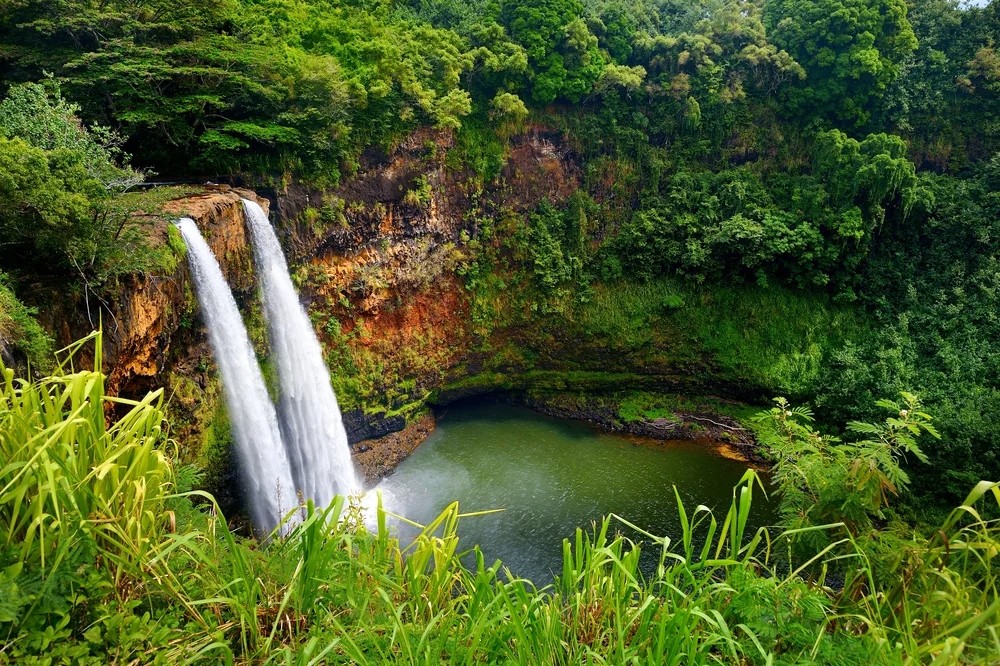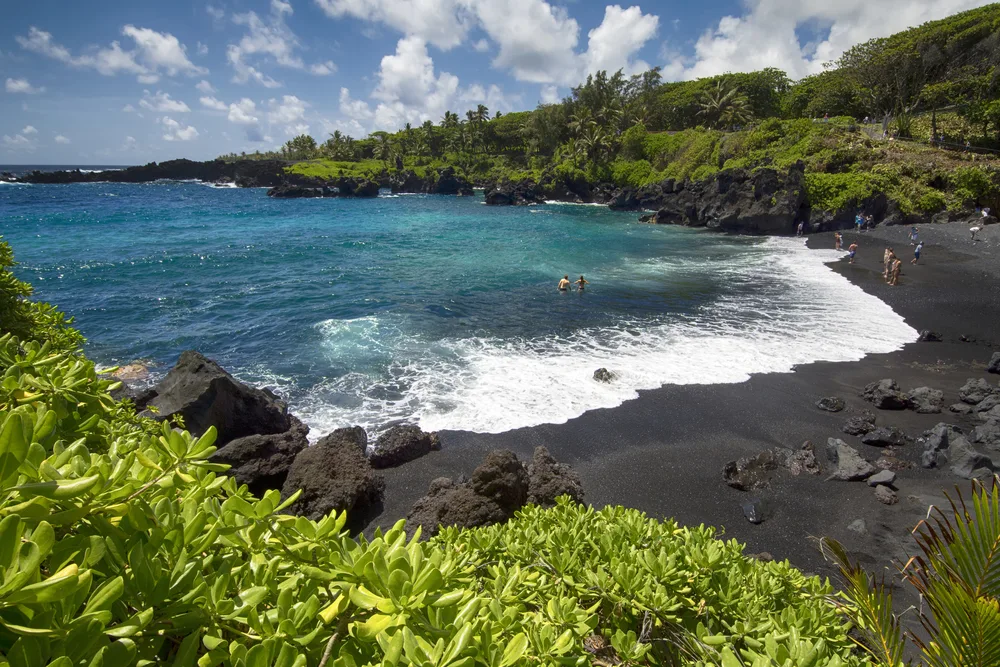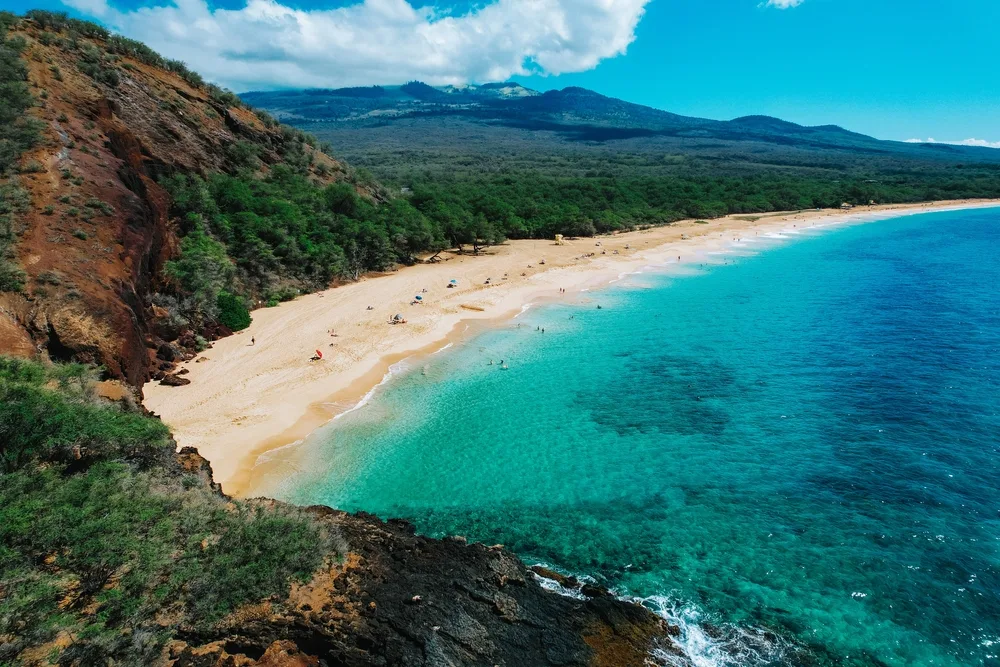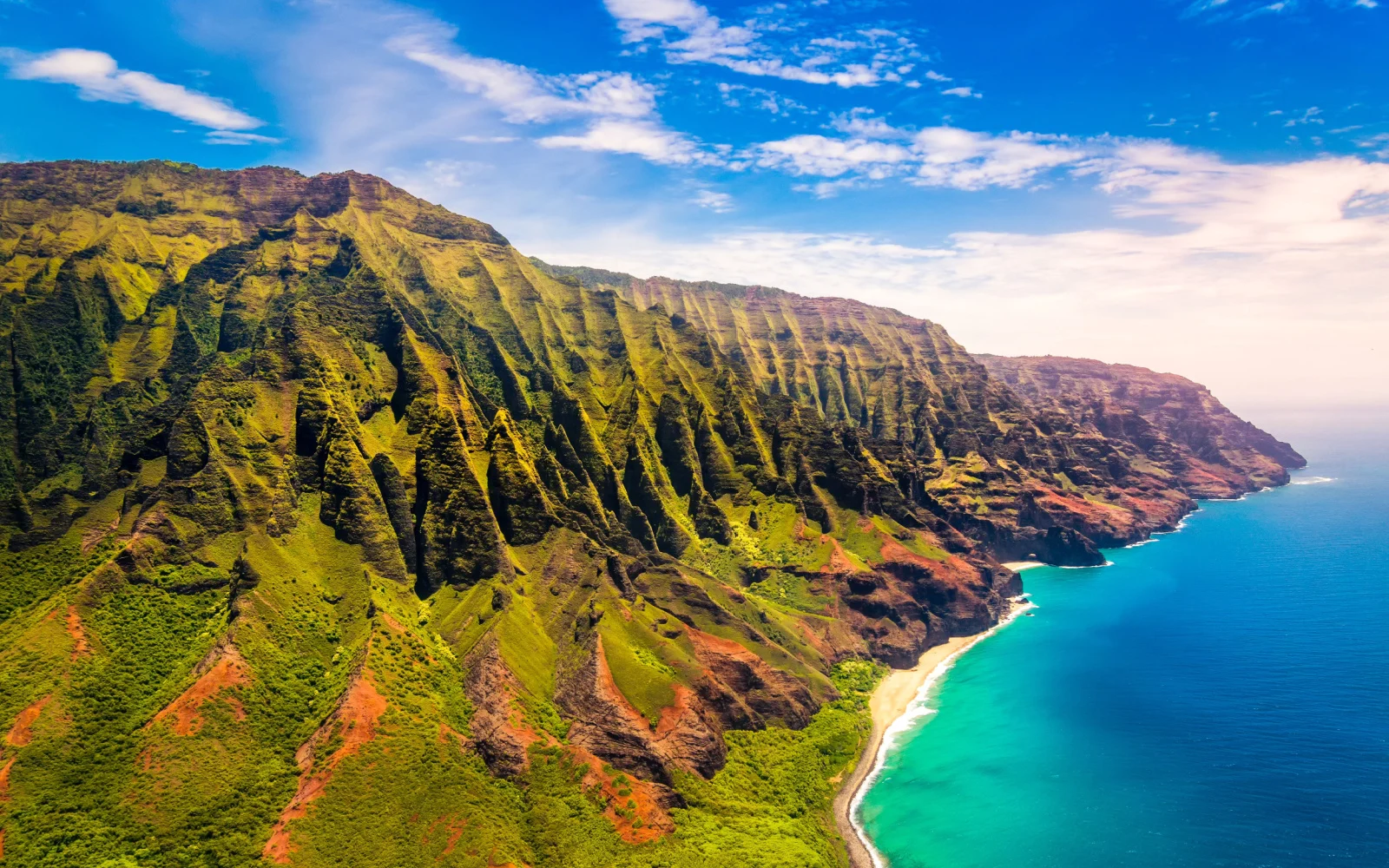Do you need a passport to go to Hawaii?
To travel to Hawaii, if you’re a U.S. citizen or Permanent Resident, you won’t need a passport; a government-issued photo ID like a driver’s license will suffice for domestic travel. However, if you’re not a U.S. citizen or Permanent Resident, you will need a passport, and depending on your citizenship, additional travel documents may be required to visit Hawaii.
A trip to the Hawaiian islands feels like a faraway getaway, but do you need a passport to go to Hawaii? Find out who needs a passport to travel to the islands — and who doesn’t — in our quick guide.
Sitting in the central Pacific Ocean, the islands of Hawaii are known for their lush and tropical scenery complete with verdant volcanic mountains and valleys, sweet-smelling flowers blooming everywhere, and endless outdoor adventures (or total relaxation on the shore).
Going to Hawaii might feel like you’re taking a trip to another country, or another planet, if you’re not normally surrounded by this kind of tropical beauty. If you’re traveling from the U.S., do you need a passport to go to Hawaii? What about if you’re traveling from another country as a non-U.S. citizen?
We’ve got all the answers below to make sure you’ve got the proper travel documents, plus recommendations to help you plan the best trip to Hawaii for your budget and goals!
Do You Need a Passport to Go to Hawaii If You’re a U.S. Citizen?

Cautron Live/Shutterstock
Great news: You do not need a passport to go to Hawaii if you’re a U.S. citizen. Hawaii is a state like any other (though in many ways, it’s unlike any other!) and you won’t need to show a passport to travel here if you’re a citizen of the United States.
Passports are required for international travel when you’re crossing the border of another country by car, plane, train, or boat. If you’re engaging in domestic travel within your own country, passports are not needed.
People often question whether or not they need a passport to go to Hawaii because the islands are so remote and the flights can be much longer than it takes to travel to contiguous U.S. states. But since Hawaii is a full-fledged state (and has been since 1959), a passport is not required to travel here.
Read Next: How Long Is a Flight to Hawaii?
Travel Documents Needed to Go to Hawaii
- Valid government-issued photo ID
- Children under 18: No ID required
A valid form of identification issued by the government is all U.S. citizens need to go to Hawaii. Most people bring their state-issued driver’s license to satisfy this requirement, but military DOD ID, VHIC cards, and DHS Trusted Traveler ID are also accepted along with others.
If you just got your passport book or card and are really excited about it, those are acceptable forms of photo ID for domestic flights to Hawaii (and other states). But they’re not necessary by any means!
So why do you need a photo ID to go to Hawaii? On a cruise to Hawaii, a valid photo ID is needed to board the vessel.
If you fly, you’ll have to go through airport security to get there. Boarding a domestic flight to Hawaii requires you to bring a valid photo ID to clear TSA security at the airport. Your ID proves that you are who you say you are and helps keep air travel safe in the United States.
Children under the age of 18 won’t need a government-issued photo ID to fly to Hawaii as long as they’re traveling with an adult that does have a valid ID presented at the time of travel. If you’re bringing an infant along to ride on your lap during the flight, the airline might request that you bring proof of their age.
Do You Need a Passport to Go to Hawaii If You’re Not a U.S. Citizen?

MNStudio/Shutterstock
- Mexico: Valid passport + B2 visa or BCC
- Canada: Valid passport + NEXUS card (optional)
- Other countries: Valid passport + B2 visa or visa waiver
Non-U.S. citizens that live in the U.S. with Permanent Resident (Green Card) status can travel to Hawaii without a passport. Just make sure you bring your valid Permanent Resident card to show as your form of ID.
Canadian citizens need a valid passport to go to Hawaii. Tourist visas are not needed in most cases. It’s recommended to get a NEXUS card as well ($50 and valid for 5 years) that allows you to speed through airport security and use the TSA PreCheck line.
Mexican citizens need a valid Mexico passport to go to Hawaii. Tourist visas are also required but can be substituted with a Border Crossing Card (BCC) that acts like a B1 or B2 visitor’s visa.
Citizens of other countries can travel to Hawaii with a valid passport and B2 tourist visa for stays under 6 months. But the Visa Waiver Program (VWP) allows citizens from 41 countries to go to Hawaii with a valid passport and forego the visa application process as long as the stay is under 90 days.
Citizens of the following countries can take advantage of the Visa Waiver Program:
- Andorra
- Australia
- Austria
- Belgium
- Brunei
- Chile
- Croatia
- Czech Republic
- Denmark
- Estonia
- Finland
- France
- Germany
- Greece
- Hungary
- Iceland
- Ireland
- Israel
- Italy
- Japan
- Latvia
- Liechtenstein
- Lithuania
- Luxembourg
- Malta
- Monaco
- Netherlands
- New Zealand
- Norway
- Poland
- Portugal
- San Marino
- Singapore
- Slovakia
- Slovenia
- South Korea
- Spain
- Sweden
- Switzerland
- Taiwan
- United Kingdom
Things to Consider Before Visiting Hawaii

Artazum/Shutterstock
Getting the proper travel documents in order is the first step to planning an awesome Hawaiian getaway. You should also start thinking about how long you’ll stay, what to pack, which island to visit, and things to do. Here are our best recommendations!
How Long Should You Stay in Hawaii?
We recommend staying in Hawaii for 7-14 days, depending on your budget and schedule. Flying to Hawaii can take just under 6 hours to over 11 hours when you fly direct from the contiguous United States, so you probably don’t want to plan a short trip when you come to visit.
Each Hawaiian island has so much to explore that it can take several days to really feel like you’ve gotten to experience it all. After a several-hour flight, you can pretty much cross out your first day in Hawaii for getting settled in your hotel, resting, and getting to know the immediate area.
If you don’t have a ton of time but want to get a good sense of what Hawaii is all about, you can plan on spending 5-7 days here. You may have to be choosy about your itinerary and spend less time out and about, but you’ll still be able to enjoy the island you visit.
If you want to squeeze in as much fun as possible on your trip, you might have plans for hiking, beach time, water sports, exploring the town, heading out to see historic plantations and landmarks, and more. For a jam-packed trip where you can see and do it all, plan to spend 10-14 days in Hawaii.
Note: If you’re traveling as part of the Visa Waiver Program (VWP), your stay will automatically be limited to 90 days or less. For B2 visas, your stay will need to be under 6 months, though you can apply for 6-month extensions.
What to Pack for Hawaii
Hawaii is warm year-round with a tropical climate that calls for lightweight clothing, swimwear, comfortable shoes for hiking and walking, and plenty of sun protection.
Lightweight, breathable clothing, preferably in light colors that keep you cool, is a must for any Hawaii trip. Pack enough tank tops, t-shirts, button-down short-sleeved shirts (gotta go for the classic Hawaiian shirt here!), swimsuits, and shorts or lightweight pants to get you through your trip.
Your footwear is important in Hawaii, too. If you’ll be hiking along Hawaii’s trails and rugged parks, bring comfortable, sturdy footwear that won’t leave you with blisters or sore feet. Break them in before your trip! Sandals, flip flops, and lightweight footwear that’s comfortable enough for walking through town or down to the beach is also essential in Hawaii.
Sun protection is the name of the game in Hawaii. Hats, sunglasses with UV protection, UV-protective clothing and swimwear, and reef-safe sunscreen (required since 2021) will all save your skin from painful burns.
Since Hawaii can experience rainy days, you might want to bring a small travel umbrella in your carry-on bag. A lightweight rain jacket is another good idea if you’ll be hiking and happen to get caught in a shower!
Which Hawaiian Island Should You Visit?

Photo Image/Shutterstock
A big part of planning a trip to Hawaii is deciding which major island is the best fit for you: Oahu, the Big Island, Maui, or Kauai. They’re all similar, but have notable differences that can make one a better choice for your trip goals and budget.
Oahu is the busiest, most popular island and home to the capital, Honolulu. It’s the most common choice for travelers and has tons of resorts, hotels, restaurants, adventure tours, and water activities to choose from.
Oahu tends to be one of the most affordable islands to visit because it has so many options at all price points. Expect bigger crowds during peak season between December and February.
The Big Island is the largest island and very popular with tourists, but it’s not as busy as Oahu. There are more natural, undeveloped areas here, several volcanoes, and lots of lava rock shoreline.
You’ll find a range of resorts, hotels, and restaurants on the Big Island around Kona and Hilo, the two main cities on the western and eastern coasts.
Maui is a popular island to visit and the second-largest with some stunning beaches and really nice resorts. It’s more expensive to visit but this is one of the most romantic and picturesque islands in Hawaii.
Maui features the only inter-island ferry between Hawaiian islands that goes to Lanai, a small island that’s natural and feels secluded.
Kauai is known as the Garden Isle because it’s truly lush and less developed than the other major islands. With so many rural areas, you get a better sense of the “real” Hawaii here, but it’s more expensive to visit here.
That’s partially because there are fewer resorts and hotels on Kauai, and the ones that are here charge more because of the exclusivity and seclusion.
Things to Do in Hawaii
Once you’ve nailed down the best island to visit, you’ll be able to start planning fun things to do in Hawaii. Your itinerary will depend on the island you visit, so take a look at some of the highlights you shouldn’t miss on each of the main islands.
- Oahu: Waikiki Beach, Diamond Head State Monument, Pearl Harbor National Memorial, and Iolani Palace
- The Big Island: Hawai’i Volcanoes National Park, Pu’uhonua O Honaunau National Historical Park, Waipi’o Valley Lookout, black sand beaches, and Kona Coffee Farm tours
- Maui: Road to Hana, Ho’okipa Beach Park, Wailea Beach, Maui Ocean Center, and ʻĪao Valley State Monument
- Kauai: Na Pali Coast tours, Wailua Falls, Waimea Canyon State Park, Kauai Museum, and Allerton Garden
You can enjoy activities like snorkeling, scuba diving, sailing and boating, hiking, biking, and cultural experiences like luaus on any of the Hawaiian islands to make your visit complete.
Frequently Asked Questions

Aspects and Angles/Shutterstock
We’ve found some questions related to passport requirements for traveling to Hawaii. Take a look at those below and learn more to help you plan your trip!
Can I go to Hawaii without a passport?
All U.S. citizens and Permanent Residents can go to Hawaii without a passport as long as you have a valid photo ID issued by the government (like a driver’s license or military ID). If you are not a U.S. citizen or Permanent Resident, you will need a passport and may need a B2 visa to go to Hawaii.
There are 41 countries that the United States honors a Visa Waiver Program with, meaning citizens of those countries won’t need a tourist visa to enter the country (including Hawaii) as long as the stay is less than 90 days.
Can I travel to Hawaii with just my driver's license?
If you are a U.S. citizen, you can travel to Hawaii with just your driver’s license. Permanent Residents will need to carry their Permanent Resident card (Green Card) to travel to Hawaii via plane.
You can use your driver’s license, military ID, VHIC card, passport card, or passport book to enter Hawaii.
Do you need a passport to go to Alaska or Hawaii?
You do not need a passport to go to Alaska or Hawaii if you are a U.S. citizen or Permanent Resident.
A government-issued photo ID or Permanent Resident card is sufficient for domestic travel from the contiguous U.S. to Alaska or Hawaii.
Do you need a passport to go to Hawaii on a cruise?
You do not need a passport to go to Hawaii on a cruise if you meet the following criteria: You are a U.S. citizen, your cruise will not stop in a country outside of the U.S., and you have a valid government-issued photo ID to present.
Is it cheaper to fly to Hawaii or take a cruise?
It’s possible to find cruises that are cheaper than flying round trip to Hawaii, paying for a hotel or resort, and covering your food, drink, and entertainment expenses while on the island.
Cruises typically include your room and board, meals, drinks, and entertainment in one all-inclusive cost, making them cheaper overall than flying and paying for everything separately.
So, Do You Need a Passport to Go to Hawaii?
The final word: If you’re a U.S. citizen or Permanent Resident, you do not need a passport to go to Hawaii. All you need is a government-issued photo ID (driver’s license, military ID, Green Card, etc.) because it’s considered domestic travel.
If you’re not a U.S. citizen or Permanent Resident, you do need a passport to go to Hawaii. You might need an additional travel document, like a Border Crossing Card (Mexico), a NEXUS card (Canada), or a B2 visitor’s visa (for countries not included in the Visa Waiver Program).
The ease of domestic travel makes Hawaii such a great destination for U.S. citizens and residents that don’t want to go through the hassle and waiting period of applying for a passport.
And even if you need a passport as you travel to the islands from outside the U.S., you’ll find that the tropical scenery and island vibes here make it well worth it!



